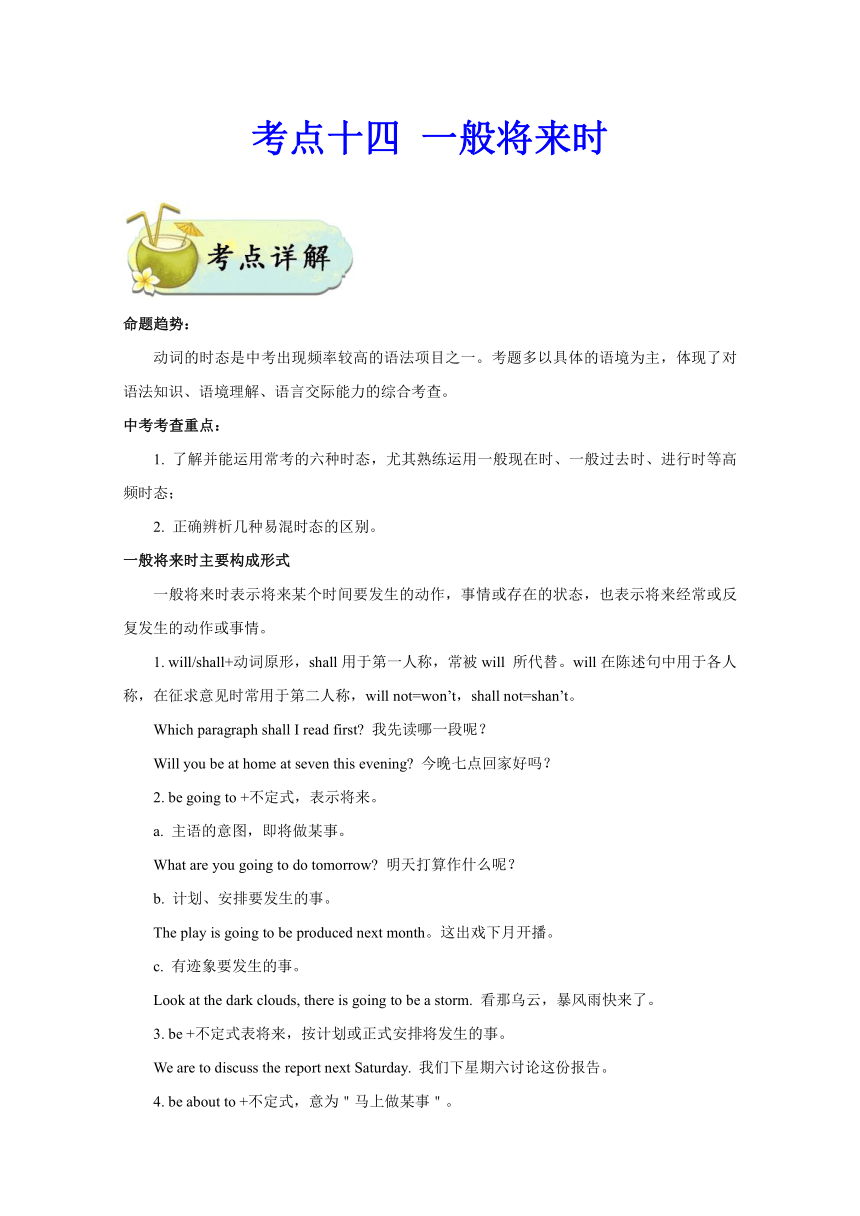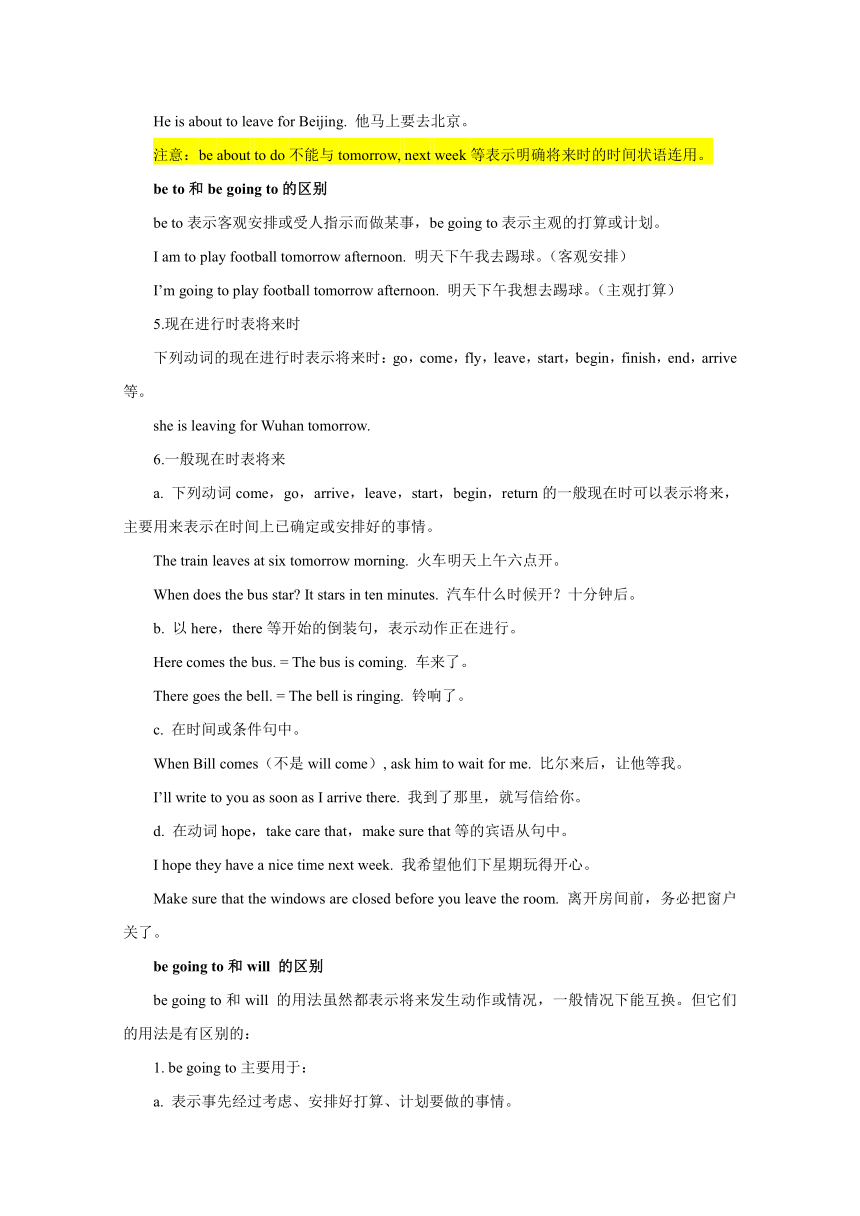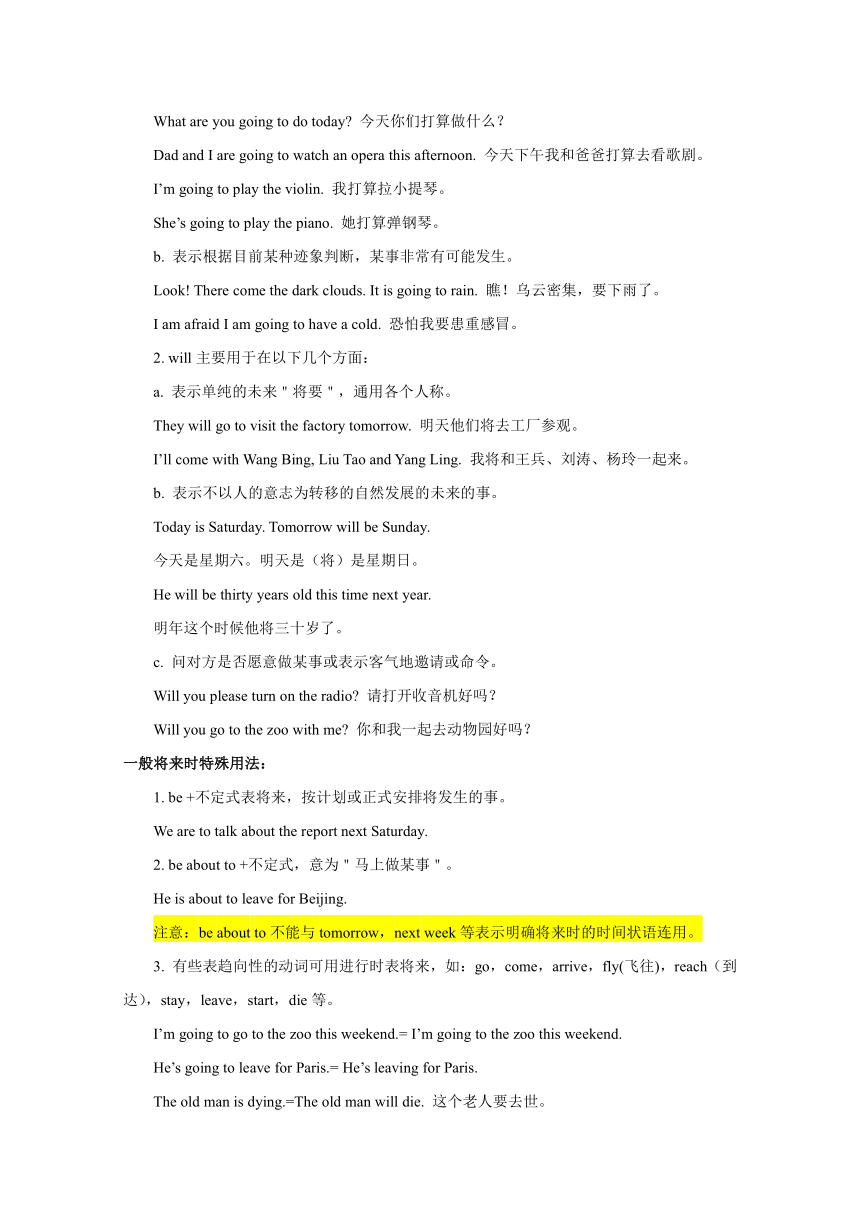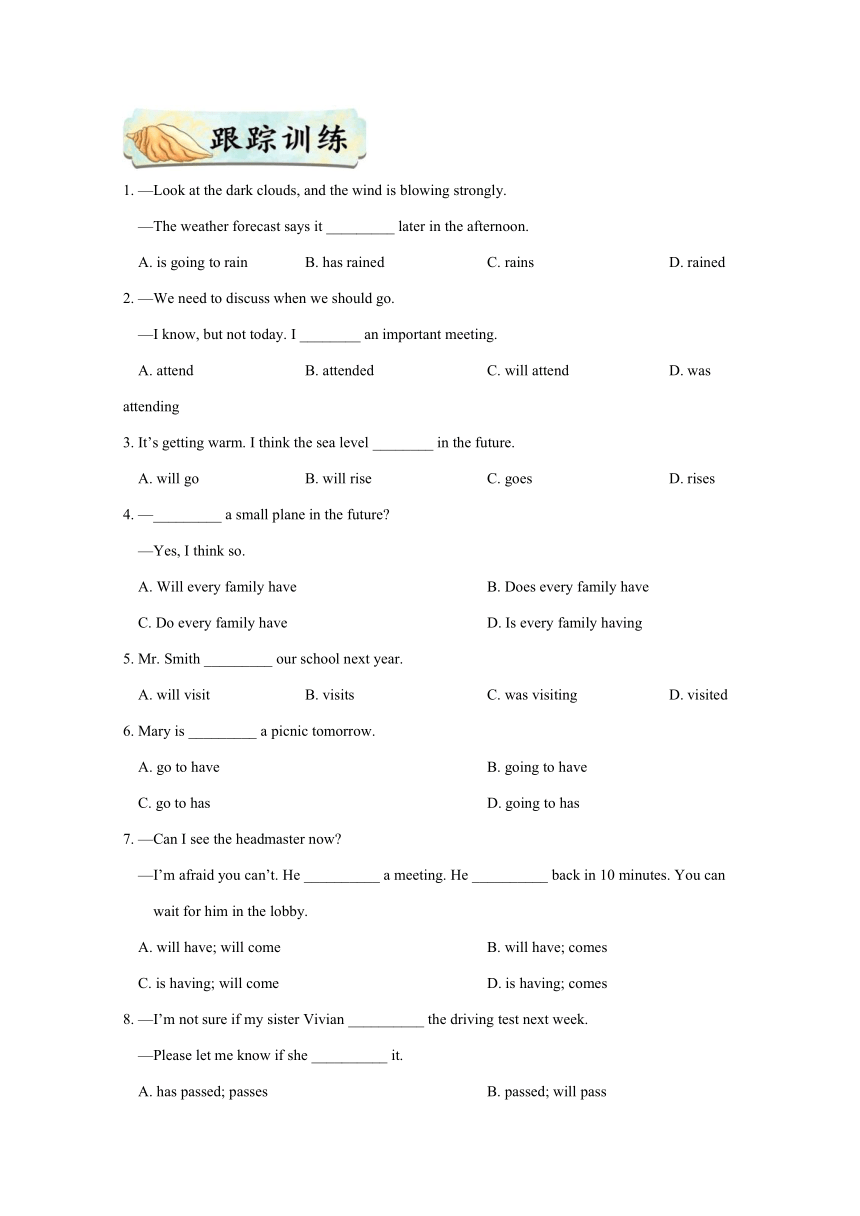2023-2024学年中考专项复习专题14:一般将来时(含解析)
文档属性
| 名称 | 2023-2024学年中考专项复习专题14:一般将来时(含解析) |  | |
| 格式 | docx | ||
| 文件大小 | 614.2KB | ||
| 资源类型 | 教案 | ||
| 版本资源 | 通用版 | ||
| 科目 | 英语 | ||
| 更新时间 | 2024-06-03 15:59:23 | ||
图片预览





文档简介
考点十四 一般将来时
命题趋势:
动词的时态是中考出现频率较高的语法项目之一。考题多以具体的语境为主,体现了对语法知识、语境理解、语言交际能力的综合考查。
中考考查重点:
1. 了解并能运用常考的六种时态,尤其熟练运用一般现在时、一般过去时、进行时等高频时态;
2. 正确辨析几种易混时态的区别。
一般将来时主要构成形式
一般将来时表示将来某个时间要发生的动作,事情或存在的状态,也表示将来经常或反复发生的动作或事情。
1. will/shall+动词原形,shall用于第一人称,常被will 所代替。will在陈述句中用于各人称,在征求意见时常用于第二人称,will not=won’t,shall not=shan’t。
Which paragraph shall I read first 我先读哪一段呢?
Will you be at home at seven this evening 今晚七点回家好吗?
2. be going to +不定式,表示将来。
a. 主语的意图,即将做某事。
What are you going to do tomorrow 明天打算作什么呢?
b. 计划、安排要发生的事。
The play is going to be produced next month。这出戏下月开播。
c. 有迹象要发生的事。
Look at the dark clouds, there is going to be a storm. 看那乌云,暴风雨快来了。
3. be +不定式表将来,按计划或正式安排将发生的事。
We are to discuss the report next Saturday. 我们下星期六讨论这份报告。
4. be about to +不定式,意为"马上做某事"。
He is about to leave for Beijing. 他马上要去北京。
注意:be about to do不能与tomorrow, next week等表示明确将来时的时间状语连用。
be to和be going to的区别
be to表示客观安排或受人指示而做某事,be going to表示主观的打算或计划。
I am to play football tomorrow afternoon. 明天下午我去踢球。(客观安排)
I’m going to play football tomorrow afternoon. 明天下午我想去踢球。(主观打算)
5.现在进行时表将来时
下列动词的现在进行时表示将来时:go,come,fly,leave,start,begin,finish,end,arrive等。
she is leaving for Wuhan tomorrow.
6.一般现在时表将来
a. 下列动词come,go,arrive,leave,start,begin,return的一般现在时可以表示将来,主要用来表示在时间上已确定或安排好的事情。
The train leaves at six tomorrow morning. 火车明天上午六点开。
When does the bus star It stars in ten minutes. 汽车什么时候开?十分钟后。
b. 以here,there等开始的倒装句,表示动作正在进行。
Here comes the bus. = The bus is coming. 车来了。
There goes the bell. = The bell is ringing. 铃响了。
c. 在时间或条件句中。
When Bill comes(不是will come), ask him to wait for me. 比尔来后,让他等我。
I’ll write to you as soon as I arrive there. 我到了那里,就写信给你。
d. 在动词hope,take care that,make sure that等的宾语从句中。
I hope they have a nice time next week. 我希望他们下星期玩得开心。
Make sure that the windows are closed before you leave the room. 离开房间前,务必把窗户关了。
be going to和will 的区别
be going to和will 的用法虽然都表示将来发生动作或情况,一般情况下能互换。但它们的用法是有区别的:
1. be going to主要用于:
a. 表示事先经过考虑、安排好打算、计划要做的事情。
What are you going to do today 今天你们打算做什么?
Dad and I are going to watch an opera this afternoon. 今天下午我和爸爸打算去看歌剧。
I’m going to play the violin. 我打算拉小提琴。
She’s going to play the piano. 她打算弹钢琴。
b. 表示根据目前某种迹象判断,某事非常有可能发生。
Look! There come the dark clouds. It is going to rain. 瞧!乌云密集,要下雨了。
I am afraid I am going to have a cold. 恐怕我要患重感冒。
2. will主要用于在以下几个方面:
a. 表示单纯的未来"将要",通用各个人称。
They will go to visit the factory tomorrow. 明天他们将去工厂参观。
I’ll come with Wang Bing, Liu Tao and Yang Ling. 我将和王兵、刘涛、杨玲一起来。
b. 表示不以人的意志为转移的自然发展的未来的事。
Today is Saturday. Tomorrow will be Sunday.
今天是星期六。明天是(将)是星期日。
He will be thirty years old this time next year.
明年这个时候他将三十岁了。
c. 问对方是否愿意做某事或表示客气地邀请或命令。
Will you please turn on the radio 请打开收音机好吗?
Will you go to the zoo with me 你和我一起去动物园好吗?
一般将来时特殊用法:
1. be +不定式表将来,按计划或正式安排将发生的事。
We are to talk about the report next Saturday.
2. be about to +不定式,意为"马上做某事"。
He is about to leave for Beijing.
注意:be about to不能与tomorrow,next week等表示明确将来时的时间状语连用。
3. 有些表趋向性的动词可用进行时表将来,如:go,come,arrive,fly(飞往),reach(到达),stay,leave,start,die等。
I’m going to go to the zoo this weekend.= I’m going to the zoo this weekend.
He’s going to leave for Paris.= He’s leaving for Paris.
The old man is dying.=The old man will die. 这个老人要去世。
1. —Look at the dark clouds, and the wind is blowing strongly.
—The weather forecast says it _________ later in the afternoon.
A. is going to rain B. has rained C. rains D. rained
2. —We need to discuss when we should go.
—I know, but not today. I ________ an important meeting.
A. attend B. attended C. will attend D. was attending
3. It’s getting warm. I think the sea level ________ in the future.
A. will go B. will rise C. goes D. rises
4. —_________ a small plane in the future
—Yes, I think so.
A. Will every family have B. Does every family have
C. Do every family have D. Is every family having
5. Mr. Smith _________ our school next year.
A. will visit B. visits C. was visiting D. visited
6. Mary is _________ a picnic tomorrow.
A. go to have B. going to have
C. go to has D. going to has
7. —Can I see the headmaster now
—I’m afraid you can’t. He __________ a meeting. He __________ back in 10 minutes. You can wait for him in the lobby.
A. will have; will come B. will have; comes
C. is having; will come D. is having; comes
8. —I’m not sure if my sister Vivian __________ the driving test next week.
—Please let me know if she __________ it.
A. has passed; passes B. passed; will pass
C. passes; has passed D. will pass; passes
9. The teacher said, "Jerry, I hope you ________ more careful next time."
A. will be B. are C. were D. would be
10. Lucy is happy because she _________ presents next weekend.
A. receives B. receive C. will receive D. are going to receive
1. She ________ an English magazine when I came in.
A. reads B. had read C. will read D. was reading
2. If you are caught smoking in the kitchen, you ________ by your boss.
A. will fire B. are fired C. will be fired
3. —Do you think ________ at home on computer in the future
—Yes, I think they needn’t go to school.
A. kids will study B. did kids study C. kids studied D. will kids study
4.—________ people do housework ________ twenty years
—No, I don’t think so.
A. Do; in B. Are; after C. Will; for D. Will; in
5. The TV news reports that there ________ a storm the day after tomorrow
A. is B. was C. will be D. has be
6. Michael ________ in a school in Yunnan from February to June next year.
A. teach B. taught C. will teach D. was teaching
7. With the development of science and technology, robot cooks ________ in our families in the future.
A. appear B. appeared C. will appear D. is appearing
8.—What ________ if they ________ to the meeting late
—Sorry, I don’t know.
A. will happen; go B. happened; go
C. happens; will go D. will happen; will go
9.—How many children do most post-80s families have
—One. They ________ two in the future, I guess.
A. will have B. had C. have D. have had
10.I don’t know when he ________ back. Please tell me when he ________ back.
A. comes; comes B. comes; will come C. will come; comes
1.—I don’t know when _________tomorrow.
—I will call you as soon as he _________.
A. will he come; arrives B. he will come; arrives C. he will come; will arrive
2.He ______ in three days.
A. coming back B. came back C. will come back D. has come back
3.I’m busy now. I ______ to you after school this afternoon.
A. talk B. have talked C. will talk
4.—Mr. Lee was talking to a student when I entered the classroom this morning.
—He is very patient, but he _______ to his motherland soon.
A. return B. returns C. returned D. will return
5.If it is clear tomorrow, I ________a bike to the underground station.
A. ride B. will ride C. rode D. have ridden
6.I’m glad to hear you ________ to a new house next week.
A. move B. moved C. have moved D. will move
7.—Are you sure if Lucy _________ for dinner tomorrow
—I’m not sure. If she________ we will ask Lily instead.
A. comes; won’t come B. will come; won’t come C. will come; doesn’t come
8.As you go through this book, you ________ that each of the millions of people who lived through World War II had a different experience.
A. will find B. found C. had found D. have found
9.—I wonder if we ________ four days off by the end of this month.
—I hope so. But if our task ________ finished, we’ll have to work overtime.
A. will have;won’t B. have;won’t
C. will have;isn’t D. have;doesn’t
10.—I think the plan is just a waste of time. What do you think
—Well, if you don’t support the plan, ________.
A. neither do I B. so do I C. neither will I D. so will I
跟踪训练
1. A 【解析】句意:——看那片乌云,风刮得很大。——天气预报说下午晚些时候将要下雨。根据The weather forecast says可知天气预报说的内容是将要发生的,故此处用一般将来时,故选A。
3. B 【解析】句意:天变得暖和了。我想海平面在未来将会升高。go去,rise升高。根据in the future可知此处用一般将来时,结合句意,天气变暖,海面升高,故选B。
4. A 【解析】句意:——在将来每个家庭将有一架小飞机吗?——是的,我认为是这样的。根据in the future可知此处用一般将来时,故选A。
5. A 【解析】句意:史密斯先生下一年将参观我们的学校。根据时间状语next year判断,时态为一般将来时态,故答案为A。
6. B 【解析】句意:明天玛丽将去野餐。根据时间状语tomorrow可知此处用一般将来时,be going to do sth将要做某事,故选B。
7. C 【解析】句意:——我现在能见校长吗?——恐怕不能。他正在开会。他10分钟后将回来。你可以在大厅里等他。根据Can I see the headmaster now 可知此处表示现在正在,故第一空用现在进行时be doing。第二空根据时间状语in 10 minutes可知此处用一般将来时,故选C。
9. A 【解析】句意:老师说:"Jerry,我希望你下次更认真些。"根据next time可知此处用一般将来时will+动词原形。故选A。
10. C 【解析】句意:露丝很高兴因为她下周她将收到礼物。此句中时间next weekend,意思是"下周末",可知用将来时,选C或D,主语she第三人称单数形式,应用be动词is的形式,will用于各种人称,故D错误,选C。
真题再现
1. D【解析】句意:当我进来的时候,她正在读一本英语杂志。本题考查过去进行时。A. reads一般现在时;B. has read现在完成时;C. will read一般将来时;D. was reading过去进行时。根据句意“当我进来的时候,她____一本英语杂志”,可知主句应用进行时态,从句中的动词came为一般过去式,所以这里应用过去进行时,结构为was/were+动词现在分词,主语是she,所以用was,故答案选D。
2. C【解析】句意:如果你在厨房里被抓到吸烟,你就会被老板开除。你只能“被开除”,所以需要使用被动语态be done,如果主句是将来时,那么if引导的条件状语从句用一般现在时表将来,这是主将从现的用法,本题中从句是说如果被抓到抽烟的话,用了一般现在时,那么主句用一般将来时,表示“你将会被开除”,所以用一把将来时的被动语态,will be done,故选C。
3. A【解析】句意:——你认为孩子们在将来会在家里在电脑上学习吗?——会的,我认为他们不需要去学校。本题考查宾语从句,宾语从句用陈述句语序,排除B和D,且根据in the future可知,用一般将来时,故选A。
4. D【解析】句意:——二十年后人们还会做家务吗?——不,我认为不会。Do是助动词,用于一般现在时态;Are 是be动词的形式,在这里不合适,句中do是实意动词;will一般将来时态;in与一般将来时态搭配,后面跟一段时间,表示“在……之后”;after与一般将来时态搭配,后面跟时间点,表示“在…之后”;for后常跟一段时间,常与现在完成时态搭配使用。根据句意可知,这里问的是“二十年之后”,应用一般将来时态,介词用in。故选D。
7. C 【解析】考查一般将来时的用法。句意:随着科学和技术的发展,机器人煮饭机在未来将出现在我们的家庭中。A. appear出现,动词原形;B. appeared动词过去式;C. will appear将来时态;D. is appearing现在进行时。根据时间状语可知用将来时,故选C。
8. A 【解析】考查一般将来时的用法。句意:——如果他们开会迟到会怎么样?——对不起,我不知道。If引导的在条件状语从句不能用将来时,而用一般现在时来代替,遵循主将从现的原则。故选A。
9. A 【解析】考查一般将来时的用法。句意:——大部分80后的家庭有几个孩子?——一个。我猜想将来他们会有两个的。A. will have将会有;B、C和D分别是have的过去式、现在式和完成时形式,都和"in the future"不符。故选A。
10. C 【解析】考查一般将来时的用法。句意:我不知道他什么时间回来。当他回来时请告诉我。第一句中when he ______ back是宾语从句,主句用一般现在时,所以从句根据需要应该用一般将来时;第二句是时间状语从句,根据主从句的动作都未发生,所以从句用一般现在时表示将来。故选C。
模拟检测
1. B 【解析】句意:——我不知道他明天什么时候会来。——他一来我就会给你打电话的。前一个句子是宾语从句,语序为陈述句的语序,根据tomorrow判断,时态为一般将来时态,排除A;第二个句子为as soon as引导的时间状语从句,主句为一般将来时,时间状语从句为一般现在时,故选B。
2. C 【解析】句意:他将在三天后回来。根据in three days可知此处用一般将来时,故为will come back,故选C。
3. C 【解析】句意:我现在很忙,今天下午放学后我会和你谈话。talk 是一个动词,意思是谈话。根据句意可知,我现在很忙,放学后才会和你谈话,因此这里表示的是将来的事情,应该用一般将来时,故选C。A是一般现在时;B是一般过去时。
4. D 【解析】句意:——今天上午当我走进教室的时候,Lee先生正在和一个学生谈话。——他是很有耐心的,但是他很快就要回到他的祖国了。return回去,返回;returns是第三人称单数形式;returned是过去式;will return是一般将来时态。根据句意和句中的soon可知,Lee先生还没有回去,很快就要回去了,这里说的是将来的事情,故使用一般将来时态,选D。
6. D 【解析】句意:听到你下周将搬新家,我很高兴。句子中有时间状语next week,故用一般将来时。故选D。
7. C 【解析】句意:——你相信露西明天要来吃晚餐吗?——我不确定。如果她不来,我们将要改请莉莉。前句描述明天来吃晚餐,表示将来,用一般将来时态:will come;后句中if的意思是"如果",引出条件状语从句,条件状语从句里要用一般现在时态表示将要发生的动作,主语he是第三人称单数,否定在动词原形前加doesn’t。故选C。
8. A 【解析】句意:当你通读这本书的时候,你将会发现成千上万的经历过二战的每个人都有不同的经历。As引导的时间状语从句,用一般现在时,主句用一般现在时或一般将来时,故选A。
9. C 【解析】句意:——我想知道我们在这个月底是否将会有四天的假期。——我希望如此,但是如果我们的任务没有完成,我们就将会加班。will have将会有;have有;won’t是will not的缩写形式;isn’t是is not的缩写;doesn’t是do not的缩写。第一个空前if的意思是是否,引导宾语从句,从句中表示将来的事情,故用一般将来时态;第二个空前的if是如果,引导条件状语从句,从句中用一般现在时态,主句用一般将来时态,从句中的主语our task和动词finish构成被动语态,故应用be+过去分词形式,选C。
10. C 【解析】句意:——我认为这个计划只是在浪费时间。您是怎么想的?——好,如果你不支持这个计划,我也不支持。Neither+助动词+主语,表示主语也不是……;这里是if引导的条件状语从句,主句用一般将来时,从句用一般现在时态,这里是主句,故助动词用will。根据题意,故选C。
命题趋势:
动词的时态是中考出现频率较高的语法项目之一。考题多以具体的语境为主,体现了对语法知识、语境理解、语言交际能力的综合考查。
中考考查重点:
1. 了解并能运用常考的六种时态,尤其熟练运用一般现在时、一般过去时、进行时等高频时态;
2. 正确辨析几种易混时态的区别。
一般将来时主要构成形式
一般将来时表示将来某个时间要发生的动作,事情或存在的状态,也表示将来经常或反复发生的动作或事情。
1. will/shall+动词原形,shall用于第一人称,常被will 所代替。will在陈述句中用于各人称,在征求意见时常用于第二人称,will not=won’t,shall not=shan’t。
Which paragraph shall I read first 我先读哪一段呢?
Will you be at home at seven this evening 今晚七点回家好吗?
2. be going to +不定式,表示将来。
a. 主语的意图,即将做某事。
What are you going to do tomorrow 明天打算作什么呢?
b. 计划、安排要发生的事。
The play is going to be produced next month。这出戏下月开播。
c. 有迹象要发生的事。
Look at the dark clouds, there is going to be a storm. 看那乌云,暴风雨快来了。
3. be +不定式表将来,按计划或正式安排将发生的事。
We are to discuss the report next Saturday. 我们下星期六讨论这份报告。
4. be about to +不定式,意为"马上做某事"。
He is about to leave for Beijing. 他马上要去北京。
注意:be about to do不能与tomorrow, next week等表示明确将来时的时间状语连用。
be to和be going to的区别
be to表示客观安排或受人指示而做某事,be going to表示主观的打算或计划。
I am to play football tomorrow afternoon. 明天下午我去踢球。(客观安排)
I’m going to play football tomorrow afternoon. 明天下午我想去踢球。(主观打算)
5.现在进行时表将来时
下列动词的现在进行时表示将来时:go,come,fly,leave,start,begin,finish,end,arrive等。
she is leaving for Wuhan tomorrow.
6.一般现在时表将来
a. 下列动词come,go,arrive,leave,start,begin,return的一般现在时可以表示将来,主要用来表示在时间上已确定或安排好的事情。
The train leaves at six tomorrow morning. 火车明天上午六点开。
When does the bus star It stars in ten minutes. 汽车什么时候开?十分钟后。
b. 以here,there等开始的倒装句,表示动作正在进行。
Here comes the bus. = The bus is coming. 车来了。
There goes the bell. = The bell is ringing. 铃响了。
c. 在时间或条件句中。
When Bill comes(不是will come), ask him to wait for me. 比尔来后,让他等我。
I’ll write to you as soon as I arrive there. 我到了那里,就写信给你。
d. 在动词hope,take care that,make sure that等的宾语从句中。
I hope they have a nice time next week. 我希望他们下星期玩得开心。
Make sure that the windows are closed before you leave the room. 离开房间前,务必把窗户关了。
be going to和will 的区别
be going to和will 的用法虽然都表示将来发生动作或情况,一般情况下能互换。但它们的用法是有区别的:
1. be going to主要用于:
a. 表示事先经过考虑、安排好打算、计划要做的事情。
What are you going to do today 今天你们打算做什么?
Dad and I are going to watch an opera this afternoon. 今天下午我和爸爸打算去看歌剧。
I’m going to play the violin. 我打算拉小提琴。
She’s going to play the piano. 她打算弹钢琴。
b. 表示根据目前某种迹象判断,某事非常有可能发生。
Look! There come the dark clouds. It is going to rain. 瞧!乌云密集,要下雨了。
I am afraid I am going to have a cold. 恐怕我要患重感冒。
2. will主要用于在以下几个方面:
a. 表示单纯的未来"将要",通用各个人称。
They will go to visit the factory tomorrow. 明天他们将去工厂参观。
I’ll come with Wang Bing, Liu Tao and Yang Ling. 我将和王兵、刘涛、杨玲一起来。
b. 表示不以人的意志为转移的自然发展的未来的事。
Today is Saturday. Tomorrow will be Sunday.
今天是星期六。明天是(将)是星期日。
He will be thirty years old this time next year.
明年这个时候他将三十岁了。
c. 问对方是否愿意做某事或表示客气地邀请或命令。
Will you please turn on the radio 请打开收音机好吗?
Will you go to the zoo with me 你和我一起去动物园好吗?
一般将来时特殊用法:
1. be +不定式表将来,按计划或正式安排将发生的事。
We are to talk about the report next Saturday.
2. be about to +不定式,意为"马上做某事"。
He is about to leave for Beijing.
注意:be about to不能与tomorrow,next week等表示明确将来时的时间状语连用。
3. 有些表趋向性的动词可用进行时表将来,如:go,come,arrive,fly(飞往),reach(到达),stay,leave,start,die等。
I’m going to go to the zoo this weekend.= I’m going to the zoo this weekend.
He’s going to leave for Paris.= He’s leaving for Paris.
The old man is dying.=The old man will die. 这个老人要去世。
1. —Look at the dark clouds, and the wind is blowing strongly.
—The weather forecast says it _________ later in the afternoon.
A. is going to rain B. has rained C. rains D. rained
2. —We need to discuss when we should go.
—I know, but not today. I ________ an important meeting.
A. attend B. attended C. will attend D. was attending
3. It’s getting warm. I think the sea level ________ in the future.
A. will go B. will rise C. goes D. rises
4. —_________ a small plane in the future
—Yes, I think so.
A. Will every family have B. Does every family have
C. Do every family have D. Is every family having
5. Mr. Smith _________ our school next year.
A. will visit B. visits C. was visiting D. visited
6. Mary is _________ a picnic tomorrow.
A. go to have B. going to have
C. go to has D. going to has
7. —Can I see the headmaster now
—I’m afraid you can’t. He __________ a meeting. He __________ back in 10 minutes. You can wait for him in the lobby.
A. will have; will come B. will have; comes
C. is having; will come D. is having; comes
8. —I’m not sure if my sister Vivian __________ the driving test next week.
—Please let me know if she __________ it.
A. has passed; passes B. passed; will pass
C. passes; has passed D. will pass; passes
9. The teacher said, "Jerry, I hope you ________ more careful next time."
A. will be B. are C. were D. would be
10. Lucy is happy because she _________ presents next weekend.
A. receives B. receive C. will receive D. are going to receive
1. She ________ an English magazine when I came in.
A. reads B. had read C. will read D. was reading
2. If you are caught smoking in the kitchen, you ________ by your boss.
A. will fire B. are fired C. will be fired
3. —Do you think ________ at home on computer in the future
—Yes, I think they needn’t go to school.
A. kids will study B. did kids study C. kids studied D. will kids study
4.—________ people do housework ________ twenty years
—No, I don’t think so.
A. Do; in B. Are; after C. Will; for D. Will; in
5. The TV news reports that there ________ a storm the day after tomorrow
A. is B. was C. will be D. has be
6. Michael ________ in a school in Yunnan from February to June next year.
A. teach B. taught C. will teach D. was teaching
7. With the development of science and technology, robot cooks ________ in our families in the future.
A. appear B. appeared C. will appear D. is appearing
8.—What ________ if they ________ to the meeting late
—Sorry, I don’t know.
A. will happen; go B. happened; go
C. happens; will go D. will happen; will go
9.—How many children do most post-80s families have
—One. They ________ two in the future, I guess.
A. will have B. had C. have D. have had
10.I don’t know when he ________ back. Please tell me when he ________ back.
A. comes; comes B. comes; will come C. will come; comes
1.—I don’t know when _________tomorrow.
—I will call you as soon as he _________.
A. will he come; arrives B. he will come; arrives C. he will come; will arrive
2.He ______ in three days.
A. coming back B. came back C. will come back D. has come back
3.I’m busy now. I ______ to you after school this afternoon.
A. talk B. have talked C. will talk
4.—Mr. Lee was talking to a student when I entered the classroom this morning.
—He is very patient, but he _______ to his motherland soon.
A. return B. returns C. returned D. will return
5.If it is clear tomorrow, I ________a bike to the underground station.
A. ride B. will ride C. rode D. have ridden
6.I’m glad to hear you ________ to a new house next week.
A. move B. moved C. have moved D. will move
7.—Are you sure if Lucy _________ for dinner tomorrow
—I’m not sure. If she________ we will ask Lily instead.
A. comes; won’t come B. will come; won’t come C. will come; doesn’t come
8.As you go through this book, you ________ that each of the millions of people who lived through World War II had a different experience.
A. will find B. found C. had found D. have found
9.—I wonder if we ________ four days off by the end of this month.
—I hope so. But if our task ________ finished, we’ll have to work overtime.
A. will have;won’t B. have;won’t
C. will have;isn’t D. have;doesn’t
10.—I think the plan is just a waste of time. What do you think
—Well, if you don’t support the plan, ________.
A. neither do I B. so do I C. neither will I D. so will I
跟踪训练
1. A 【解析】句意:——看那片乌云,风刮得很大。——天气预报说下午晚些时候将要下雨。根据The weather forecast says可知天气预报说的内容是将要发生的,故此处用一般将来时,故选A。
3. B 【解析】句意:天变得暖和了。我想海平面在未来将会升高。go去,rise升高。根据in the future可知此处用一般将来时,结合句意,天气变暖,海面升高,故选B。
4. A 【解析】句意:——在将来每个家庭将有一架小飞机吗?——是的,我认为是这样的。根据in the future可知此处用一般将来时,故选A。
5. A 【解析】句意:史密斯先生下一年将参观我们的学校。根据时间状语next year判断,时态为一般将来时态,故答案为A。
6. B 【解析】句意:明天玛丽将去野餐。根据时间状语tomorrow可知此处用一般将来时,be going to do sth将要做某事,故选B。
7. C 【解析】句意:——我现在能见校长吗?——恐怕不能。他正在开会。他10分钟后将回来。你可以在大厅里等他。根据Can I see the headmaster now 可知此处表示现在正在,故第一空用现在进行时be doing。第二空根据时间状语in 10 minutes可知此处用一般将来时,故选C。
9. A 【解析】句意:老师说:"Jerry,我希望你下次更认真些。"根据next time可知此处用一般将来时will+动词原形。故选A。
10. C 【解析】句意:露丝很高兴因为她下周她将收到礼物。此句中时间next weekend,意思是"下周末",可知用将来时,选C或D,主语she第三人称单数形式,应用be动词is的形式,will用于各种人称,故D错误,选C。
真题再现
1. D【解析】句意:当我进来的时候,她正在读一本英语杂志。本题考查过去进行时。A. reads一般现在时;B. has read现在完成时;C. will read一般将来时;D. was reading过去进行时。根据句意“当我进来的时候,她____一本英语杂志”,可知主句应用进行时态,从句中的动词came为一般过去式,所以这里应用过去进行时,结构为was/were+动词现在分词,主语是she,所以用was,故答案选D。
2. C【解析】句意:如果你在厨房里被抓到吸烟,你就会被老板开除。你只能“被开除”,所以需要使用被动语态be done,如果主句是将来时,那么if引导的条件状语从句用一般现在时表将来,这是主将从现的用法,本题中从句是说如果被抓到抽烟的话,用了一般现在时,那么主句用一般将来时,表示“你将会被开除”,所以用一把将来时的被动语态,will be done,故选C。
3. A【解析】句意:——你认为孩子们在将来会在家里在电脑上学习吗?——会的,我认为他们不需要去学校。本题考查宾语从句,宾语从句用陈述句语序,排除B和D,且根据in the future可知,用一般将来时,故选A。
4. D【解析】句意:——二十年后人们还会做家务吗?——不,我认为不会。Do是助动词,用于一般现在时态;Are 是be动词的形式,在这里不合适,句中do是实意动词;will一般将来时态;in与一般将来时态搭配,后面跟一段时间,表示“在……之后”;after与一般将来时态搭配,后面跟时间点,表示“在…之后”;for后常跟一段时间,常与现在完成时态搭配使用。根据句意可知,这里问的是“二十年之后”,应用一般将来时态,介词用in。故选D。
7. C 【解析】考查一般将来时的用法。句意:随着科学和技术的发展,机器人煮饭机在未来将出现在我们的家庭中。A. appear出现,动词原形;B. appeared动词过去式;C. will appear将来时态;D. is appearing现在进行时。根据时间状语可知用将来时,故选C。
8. A 【解析】考查一般将来时的用法。句意:——如果他们开会迟到会怎么样?——对不起,我不知道。If引导的在条件状语从句不能用将来时,而用一般现在时来代替,遵循主将从现的原则。故选A。
9. A 【解析】考查一般将来时的用法。句意:——大部分80后的家庭有几个孩子?——一个。我猜想将来他们会有两个的。A. will have将会有;B、C和D分别是have的过去式、现在式和完成时形式,都和"in the future"不符。故选A。
10. C 【解析】考查一般将来时的用法。句意:我不知道他什么时间回来。当他回来时请告诉我。第一句中when he ______ back是宾语从句,主句用一般现在时,所以从句根据需要应该用一般将来时;第二句是时间状语从句,根据主从句的动作都未发生,所以从句用一般现在时表示将来。故选C。
模拟检测
1. B 【解析】句意:——我不知道他明天什么时候会来。——他一来我就会给你打电话的。前一个句子是宾语从句,语序为陈述句的语序,根据tomorrow判断,时态为一般将来时态,排除A;第二个句子为as soon as引导的时间状语从句,主句为一般将来时,时间状语从句为一般现在时,故选B。
2. C 【解析】句意:他将在三天后回来。根据in three days可知此处用一般将来时,故为will come back,故选C。
3. C 【解析】句意:我现在很忙,今天下午放学后我会和你谈话。talk 是一个动词,意思是谈话。根据句意可知,我现在很忙,放学后才会和你谈话,因此这里表示的是将来的事情,应该用一般将来时,故选C。A是一般现在时;B是一般过去时。
4. D 【解析】句意:——今天上午当我走进教室的时候,Lee先生正在和一个学生谈话。——他是很有耐心的,但是他很快就要回到他的祖国了。return回去,返回;returns是第三人称单数形式;returned是过去式;will return是一般将来时态。根据句意和句中的soon可知,Lee先生还没有回去,很快就要回去了,这里说的是将来的事情,故使用一般将来时态,选D。
6. D 【解析】句意:听到你下周将搬新家,我很高兴。句子中有时间状语next week,故用一般将来时。故选D。
7. C 【解析】句意:——你相信露西明天要来吃晚餐吗?——我不确定。如果她不来,我们将要改请莉莉。前句描述明天来吃晚餐,表示将来,用一般将来时态:will come;后句中if的意思是"如果",引出条件状语从句,条件状语从句里要用一般现在时态表示将要发生的动作,主语he是第三人称单数,否定在动词原形前加doesn’t。故选C。
8. A 【解析】句意:当你通读这本书的时候,你将会发现成千上万的经历过二战的每个人都有不同的经历。As引导的时间状语从句,用一般现在时,主句用一般现在时或一般将来时,故选A。
9. C 【解析】句意:——我想知道我们在这个月底是否将会有四天的假期。——我希望如此,但是如果我们的任务没有完成,我们就将会加班。will have将会有;have有;won’t是will not的缩写形式;isn’t是is not的缩写;doesn’t是do not的缩写。第一个空前if的意思是是否,引导宾语从句,从句中表示将来的事情,故用一般将来时态;第二个空前的if是如果,引导条件状语从句,从句中用一般现在时态,主句用一般将来时态,从句中的主语our task和动词finish构成被动语态,故应用be+过去分词形式,选C。
10. C 【解析】句意:——我认为这个计划只是在浪费时间。您是怎么想的?——好,如果你不支持这个计划,我也不支持。Neither+助动词+主语,表示主语也不是……;这里是if引导的条件状语从句,主句用一般将来时,从句用一般现在时态,这里是主句,故助动词用will。根据题意,故选C。
同课章节目录
- 词法
- 名词
- 动词和动词短语
- 动词语态
- 动词时态
- 助动词和情态动词
- 非谓语动词
- 冠词
- 代词
- 数词和量词
- 形容词副词及其比较等级
- 介词和介词短语
- 连词和感叹词
- 构词法
- 相似、相近词比较
- 句法
- 陈述句
- 一般疑问句和否定疑问句
- 特殊疑问句及选择疑问句
- 反意疑问句
- 存在句(There be句型)
- 宾语从句
- 定语从句
- 状语从句
- 主谓一致问题
- 简单句
- 并列句
- 复合句
- 主谓一致
- 主、表语从句
- 名词性从句
- 直接引语和间接引语
- 虚拟语气
- 感叹句
- 强调句
- 倒装句
- 祈使句
- 句子的成分
- 句子的分类
- 题型专区
- 单项选择部分
- 易错题
- 完形填空
- 阅读理解
- 词汇练习
- 听说训练
- 句型转换
- 补全对话
- 短文改错
- 翻译
- 书面表达
- 任务型阅读
- 语法填空
- 其他资料
